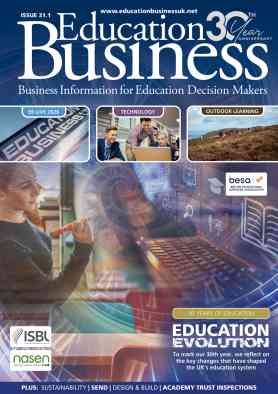
The education system: What needs to change?
The UK’s education sector is subject to constant scrutiny and evokes wildly different opinions – and rightly so. In order to create and maintain the best possible system of learning for our children, and to nurture and protect our country’s educators, candid discussions about the education sector should be encouraged.
The Education Show 2017 provided the perfect platform to have these frank and open discussions, and to discover new ways to enhance teaching and learning across different subjects, specialisms, age groups and special educational needs (SEN).
Here, several exhibitors reveal what, in their opinions, the biggest challenges facing the sector are, what changes we’re likely to see this year, what they would change about UK education and – to keep things positive – what they love about our education system.
Biggest challenges facing in education
According to Mark Robinson, founder of FindEd, teacher recruitment is the greatest challenge facing schools at present, “without a doubt”. He says: “I asked many headteachers last year that exact question and recruitment was top of the list, followed by budget cuts.” And of course, it’s not just about the significant cost of recruitment but also about attracting the right people for the profession.
Tonya Meers, chief storyteller at Little Creative Days, also spoke of a reduction in the number of teachers and budget cuts, saying: “There is a lack of funding and increased pressure on school numbers, as well as the dwindling morale of teachers who are feeling undervalued and therefore leaving the profession. Also, too many tests and too much bureaucracy is having a negative impact.”
However, according to Annie-May Roberts of First Wave Adventures, change is the biggest challenge teachers and schools are facing today: “Changing systems and moving goalposts are challenging teachers every day.”
Online safety has also emerged as a prominent concern, with Laura Atkinson of Smoothwall summarising the dangers that ill-managed internet access in schools can pose: “One of the biggest challenges facing the sector, in this increasingly digital age, is the online security and safety of both pupils and staff. The web is, at its heart, a forum for worldwide knowledge sharing, and people of all ages benefit from it every day. But with this opportunity comes danger. As the digital world becomes more and more a part of education and its curriculums, schools are under pressure to enable pupils digitally, while also protecting them from the darker side of the web such as illegal activity, cyberbullying or radicalisation.”
A time of great change
Last year was one of significant change in the education sector, and this change shows no signs of slowing down. With the rise of academies and reintroduction of grammar schools, it’s undoubtedly going to be a landmark year for UK education. Here’s what some of the exhibitors who will be at The Education Show next week are anticipating: “Bigger classes, fewer teachers and teaching staff, and less money – all potentially resulting in a fall in standards,” says Nina Simon of School Library Services. And Elizabeth Stafford, director of Music Education Solutions, agrees that problems with teacher recruitment and retention will grow this year: “The teacher recruitment and retention crises looks set to continue, and I anticipate a downturn in the number of pupils taking arts GCSE and A-level.”
Diana Somers of Language Magnet thinks the education sector should brace itself for further reductions in resources, saying: “Like most public sectors, the education sector has been hit with funding cuts and, as a result, headteachers are having to reduce staff and resources. The education sector is likely to undergo a difficult period of adjustment. Headteachers will be seriously looking at what is good value for money and worth having in schools, with effective schemes of work and the use of technology being ever-more important as schools also need to balance reduction with staying relevant to today’s society.”
Looking to the changes that will be sparked by the rapid advancements in technology, Lauren Atkinson of Smoothwall explains: “There has been a lot of noise in the past year around artificial intelligence (AI), and looking at the year ahead in education, there is great scope for AI to help both pupils and staff. AI doesn’t necessarily mean robots from the likes of iRobot or Human, parading around the classroom. As classrooms become fuller and busier and the demand on teachers increases, digital teaching assistants in the form of tablets, for example, could help alleviate the issue. They would be able to answer questions pupils may have, offer real-time explanations for those answers and may even be able to mark the children’s work on behalf of the teacher.”
UK education – the best bits
One of the things that everyone at The Education Show will have in common is this: a love of education and a commitment to driving it forward. Therefore, the exhibitors we spoke to relished the opportunity to reflect upon some of their favourite things about education in the UK.
Mark Robinson says the best thing about our education system is the people involved in it. “It’s wonderful to work with a community who are so passionate about making a difference to pupils’ lives and are willing to put so much of themselves into making it happen.” Katie Harrison, head of support at Picture News, seconds this sentiment by saying that the best thing about education in the UK is simply “our fantastic, hardworking and resilient teachers”.
Also, Diana Somers is greatly encouraged by the sector’s level of diversity: “The diversity of the education sector is one of its strengths, enabling students to explore and develop their individual talents in an environment that suits their needs.”
UK education – what needs changing?
Of course, we can’t just pat ourselves on the back and look at what is going well; it is important for us to look at what needs to change in education to ensure it is as effective and accessible as possible. Here is what some of the exhibitors would change about the current system.
Katie Harrison would like to see schools becoming more autonomous: “We need to improve school autonomy by allowing teachers much greater freedom with what and how they teach, with less scrutiny.”
Tonya Meers hopes that education decision-makers will move away from a ‘one size fits all approach, and begin to “allow children to develop more naturally”.
However, Tom Strang from TeeJay Maths thinks that a ‘back to basics’ approach may improve our education system: “The time allocation to the basics and the need to concentrate on the basics more, albeit with much more exciting bright and colourful pupil-centred resources. 40 years ago, teachers spent 90 minutes on English and 90 minutes on maths every day, using the afternoons for various other topics including history, geography, art, music and (basic) science. Maybe we need to get back to those (halcyon) days.”
All of these topics, and many more, will be up for discussion and exploration at The Education Show from 16-18 March at the NEC, Birmingham.
Further Information:Latest News
03/03/2026 - 09:57
The Scottish Government is rolling out a National Primary School Swimming Framework, a universal offer to primary aged children to learn to swim alongside learning vital water safety skills.
03/03/2026 - 09:37
Senior HM Inspector Adam Sproston will discuss the inspectorate’s approach to SEND and inclusion at Education Business LIVE in March.
02/03/2026 - 10:07
Children’s charity Youth Sport Trust has awarded the first Well School accreditations, recognising schools that are prioritising pupil and staff wellbeing alongside academic performance as a measure of success.
02/03/2026 - 09:39
The government has launched a major new consultation to gain views on how to keep children safe online across social media, AI chatbots and gaming platforms.
27/02/2026 - 14:12
LGfL-The National Grid for Learning has launched a free Artificial Intelligence (AI) Policy Toolkit to help schools across the UK develop clear approaches to AI that put safeguarding at the forefront.







